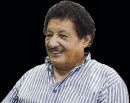- Juvenal Ravelo. Heart friend of Cuba.
«Art on the street is as the sun: it shines for everyone». That phrase -and everything in it- is a kind of “philosophy” that the Venezuelan artist Juvenal Ravelo has endorsed, an artist who believes in how much art can bring to transform a community and therefore, in those who inhabit it. National Prize of Culture of Venezuela, he visited Havana during the 12th Biennial between May and June and thanks to this participation a beautiful mural was created «as witness and a present» that welcomes those who visit Casablanca, small ultramarine village embedded east of the entrance to Havana Bay.
He graduated from the School of Fine Arts in Caracas and Martin Trovar-Trovar of Barquisimeto. Juvenal Ravelo (Monagas, December 23, 1932) has given notice murals in a dozen points of the Venezuelan geography like Maturin, Sucre, Nueva Esparta, Portuguesa, but also in France. «I always look for people to participate in art information so it stops being elitist and becomes art for all».
He revealed that during the mural a film crew captured from birth to the inauguration and all that stuff to create «an audiovisual that will remain as memory», while he said that there are two «last minute “projects that make him very excited”, a large ceramic mural for the facade of the representation of Venezuela at the United Nations and the other will be located in Old Havana, Cultural Heritage». Both projects, he said, are still being sketched and «probably be designed with durable materials and from kinetic art».
Among other details of his long career, in the interview highlights the compliments made by Julio Cortazar: «A greater compliment. (...) We met several times in Paris. I remember him saying: “Let’s talk, because I am very interested and would like to make a text with you about that idea». In 1983, the year he returned to Venezuela to make a large mural at the airport of Caracas, we agreed than when he returned to Paris we were going to work altogether. The work concluded in late December 1983 and one morning in February 1984 he was driving by Maturin, which is the capital of Monagas, and I see in the distance in a newspaper stand a photo of Cortazar, large and on the front, and I say, what reward did he receive? And when I walk I see the headline: «Julio Cortazar died». It was a very big hit and the impact that I received, and I must confess it took me time to recover from his loss.


























































